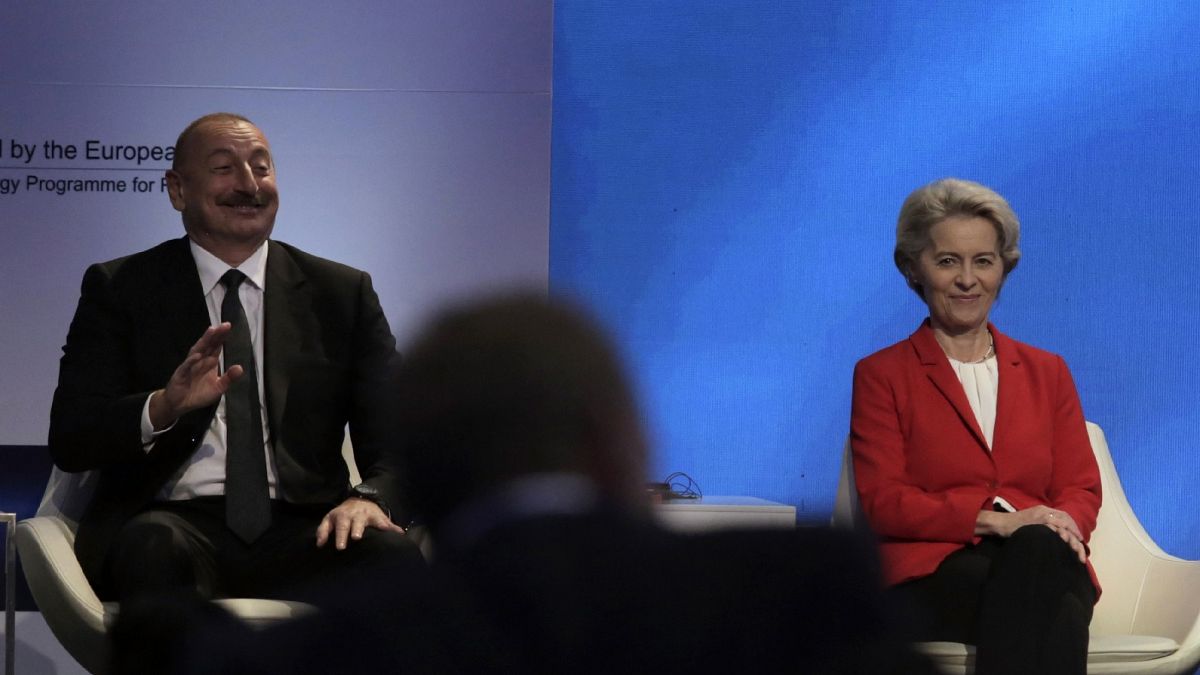Members of the European Parliament (MEPs) denounced the EU’s inaction in response to the unfolding Nagorno-Karabakh crisis on Wednesday, calling on the bloc to impose economic sanctions on Azerbaijan.
"The EU should act, impose sanctions, including stopping the imports of gas," Reinhard Bütikofer, German MEP for the Greens group, told Euronews.
On Tuesday, Baku's foreign ministry launched an "anti-terrorist" operation in Nagorno-Karabakh, the enclave which is largely governed by its ethnic Armenian population, but recognised internationally as part of Azerbaijan.
The attack follows months of brewing tensions over the breakaway region, awakening fears of a return to the hostilities of the 2020 war where thousands lost their lives.
The EU has condemned the aggression but has not introduced any retaliatory measures. The bloc recently signed a new deal to double EU imports of Azeri gas by 2027, with EU Commission chief Ursula von der Leyen calling Baku a "trustworthy" partner.
EU attempts to de-escalate the decades-old conflict between Armenia and Azerbaijan have also been unsuccessful.
In a debate in the European Parliament on Wednesday, MEPs from all political colours claimed the EU has been slow to react to Armenia's pleas for aid since Azeri forces blockaded the Lachin corridor nine months ago, preventing essential supplies such as food, medicine and fuel from reaching the ethnic Armenian population.
They also called for economic and trade sanctions as well as the suspension of all bilateral relations with Baku.
The debate came hours before the breakaway region accepted a ceasefire proposed by Russian peacekeepers, who have been present in Nagorno-Karabakh since the Moscow-brokered ceasefire in 2020. But Armenian Prime Minister Nikol Pashinyan has recently turned to the West for backing, expressing frustration at the lack of support from Russia.
"We have been unable to prevent an assault that we saw was coming," Nathalie Loiseau said.
"Mediation has been a total failure. We have never named the aggressor. We have ignored the Armenian prime minister when he called for our help," she added.
Loiseau also echoed claims made by Armenia's Pashinyan that Baku is pursuing its policy of ethnic cleansing. "Our weakness and passivity have made us accomplices of this," she said.
Baku is no 'trustworthy' partner
Parliamentarians were also scathingly critical of the EU's cosy deals with Azeri Premier Ilham Aliyev.
Von der Leyen called Baku a "trustworthy" energy partner in 2022, as she closed a deal to double EU imports of Azeri gas by 2027 in an effort to reduce reliance on Russian energy products.
EU enlargement czar Olivier Várhelyi also met the Azeri foreign affairs minister in Budapest earlier this month to discuss strategic transport and energy projects.
A spokesperson on behalf of the European Commission said on Wednesday that sanctions could only be imposed by the EU's member states, but that EU leaders would discuss possible measures during the UN General Assembly in New York.
MEPs claimed the EU's gas bill from Baku was directly funding Azerbaijan's aggression and campaign of ethnic cleansing.
EU countries imported €15.6 billion in natural gas from Azerbaijan last year, four times more than in 2021. Bulgaria, Romania, Hungary and Slovakia have also pledged to boost gas imports from the oil-rich country.
MEPs also expressed concerns that gas reaching Europe from Azerbaijan was "de facto Russian gas," and called for urgent investigations into the origin of gas imported through the southern corridor.
A spokesperson for the Commission rejected that claim, telling reporters on Wednesday that "the gas we are receiving from Azerbaijan is Caspian gas." Asked how they can be sure that the gas did not originate in Russia, the spokesperson said: "It's just a question of volumes."
"From the information that we have, the volume of gas which is exported from Russia to Azerbaijan is very significantly smaller than the gas we are importing from Azerbaijan so it's simply a case of there is not (enough) Russian gas going in on a scale of what we're importing into Europe.
Geopolitical interests
MEPs also claimed Russia and Azerbaijan have an interest in installing a puppet regime in Armenia as the Kremlin looks to reinforce its influence in the South Caucasus.
"Russia's goal is clearly to remove Armenian prime minister Pashinyan," Raphaël Glucksmann, French MEP for the Socialists and Democrats group, said. "They want to get rid of a democratic government in Armenia, which is chosen in freedom and emancipation."
"How can you hope for the European Union to assert itself as a geopolitical power if we are prepared to sacrifice such important allies as the Armenians in this way?" he asked.
Correction: The headline was amended to correct a typo with the word "now" changed into "not".
